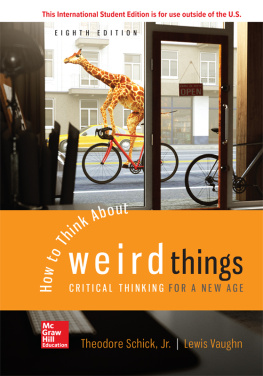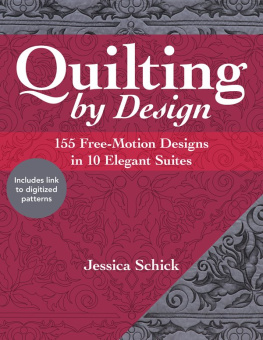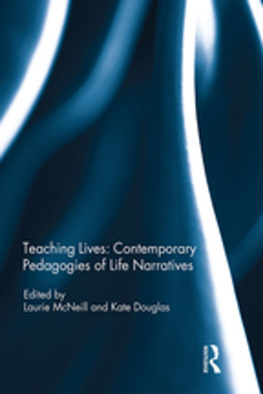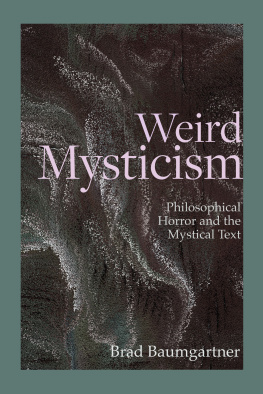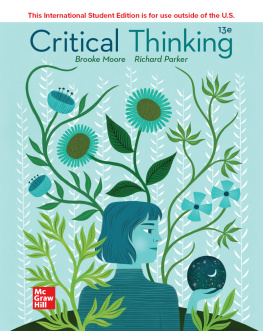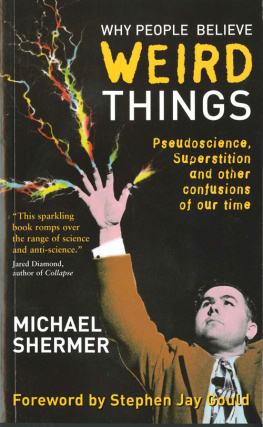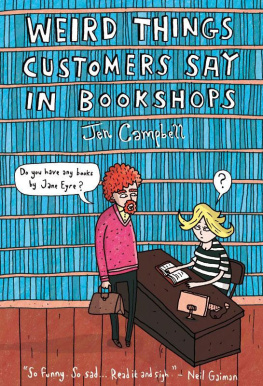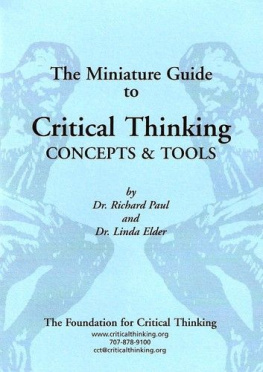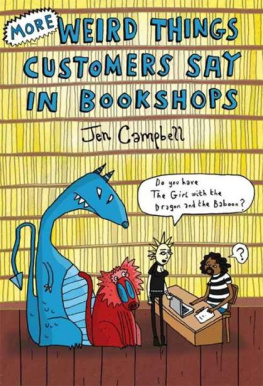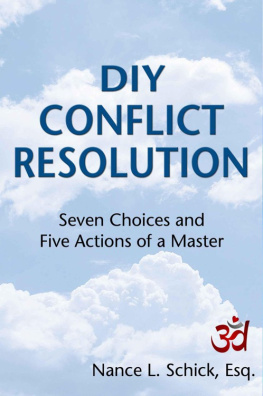SCHICK. - ISE EBOOK OLA FOR HOW TO THINK ABOUT WEIRD THINGS critical thinking for a new age.
Here you can read online SCHICK. - ISE EBOOK OLA FOR HOW TO THINK ABOUT WEIRD THINGS critical thinking for a new age. full text of the book (entire story) in english for free. Download pdf and epub, get meaning, cover and reviews about this ebook. City: S.l., year: 2019, publisher: MCGRAW-HILL US HIGHER ED, genre: Religion. Description of the work, (preface) as well as reviews are available. Best literature library LitArk.com created for fans of good reading and offers a wide selection of genres:
Romance novel
Science fiction
Adventure
Detective
Science
History
Home and family
Prose
Art
Politics
Computer
Non-fiction
Religion
Business
Children
Humor
Choose a favorite category and find really read worthwhile books. Enjoy immersion in the world of imagination, feel the emotions of the characters or learn something new for yourself, make an fascinating discovery.
ISE EBOOK OLA FOR HOW TO THINK ABOUT WEIRD THINGS critical thinking for a new age.: summary, description and annotation
We offer to read an annotation, description, summary or preface (depends on what the author of the book "ISE EBOOK OLA FOR HOW TO THINK ABOUT WEIRD THINGS critical thinking for a new age." wrote himself). If you haven't found the necessary information about the book — write in the comments, we will try to find it.
SCHICK.: author's other books
Who wrote ISE EBOOK OLA FOR HOW TO THINK ABOUT WEIRD THINGS critical thinking for a new age.? Find out the surname, the name of the author of the book and a list of all author's works by series.
ISE EBOOK OLA FOR HOW TO THINK ABOUT WEIRD THINGS critical thinking for a new age. — read online for free the complete book (whole text) full work
Below is the text of the book, divided by pages. System saving the place of the last page read, allows you to conveniently read the book "ISE EBOOK OLA FOR HOW TO THINK ABOUT WEIRD THINGS critical thinking for a new age." online for free, without having to search again every time where you left off. Put a bookmark, and you can go to the page where you finished reading at any time.
Font size:
Interval:
Bookmark:

Page ii Page iii 
Page iv 
HOW TO THINK ABOUT WEIRD THINGS
Published by McGraw-Hill Education, 2 Penn Plaza, New York, NY 10121. Copyright 2020 by McGraw-Hill Education. All rights reserved. Printed in the United States of America. No part of this publication may be reproduced or distributed in any form or by any means, or stored in a database or retrieval system, without the prior written consent of McGraw-Hill Education, including, but not limited to, in any network or other electronic storage or transmission, or broadcast for distance learning.
Some ancillaries, including electronic and print components, may not be available to customers outside the United States.
This book is printed on acid-free paper.
1 2 3 4 5 6 7 8 9 LCR 21 20 19
ISBN 978-1-260-54807-5
MHID 1-260-54807-4
Cover Image: Mediaparts/Shutterstock
All credits appearing on page or at the end of the book are considered to be an extension of the copyright page.
The Internet addresses listed in the text were accurate at the time of publication. The inclusion of a website does not indicate an endorsement by the authors or McGraw-Hill Education, and McGraw-Hill Education does not guarantee the accuracy of the information presented at these sites.
mheducation.com/highered
Page v To Erin, Kathy, Katie, Marci, Patrick, and T. J.
Every year, in English-speaking countries alone, more than a hundred books that promote the wildest forms of bogus science and the paranormal are published. The percentage of Americans today who take astrology seriously is larger than the percentage of people who did so in the early Middle Ages, when leading church theologiansSaint Augustine, for examplegave excellent reasons for considering astrology nonsense. We pride ourselves on our advanced scientific technology, yet public education in science has sunk so low that one-fourth of Americans and 55 percent of teenagers, not to mention a recent president of the nation and his first lady, believe in astrology!
Now and then a courageous publisher, more concerned with enlightening the public than with profits, will issue a book that honestly assesses pseudoscience and the paranormal. Works of this sort now in print can be counted on your fingers. It is always an occasion for rejoicing when such a book appears, and there are several ways in which How to Think about Weird Things is superior to most books designed to teach readers how to tell good science from bad.
First of all, this book covers an enormous range of bogus sciences and extraordinary claims that currently enjoy large followings in America. Second, unlike most similar books, the authors heavily stress principles that help you critically evaluate outlandish claimsand tell you why these principles are so important. Third, the books discussions are readable, precise, and straightforward.
I am particularly pleased by the books clearheaded assessment of scientific realism at a time when it has become fashionable in New Age circles to think of the laws of science as not out there, but somehow a projection of our minds and cultures. Yes, quantum mechanics has its subjective tinge. There is a sense in which an electrons properties are not definite until it is measured, but this technical aspect of quantum theory has no relevance on the macroscopic level of everyday life. In no way does the mathematical formalism of quantum mechanics imply, as some physicists smitten by Eastern religions claim, that the moon is not there unless someone looks at it. As Einstein liked to ask, Will a mouses observation make the moon real?
The authors give clear, accurate explanations of puzzling physical theories. Quantum theory indeed swarms with mind-boggling experiments that are only dimly understood. None of them justify thinking that E = mc2 is a cultural artifact, or that E might equal mc3 in Page viii Afghanistan or on a distant planet. Extraterrestrials would of course express Einsteins formula with different symbols, but the law itself is as mind-independent as Mars.
As the authors say simply: There is a way that the world is. It is the task of science to learn as much as it can about how this universe, not made by us, behaves. The awesome achievements of technology are irrefutable evidence that science keeps getting closer and closer to objective truth.
As the authors tell us, there are two distinct kinds of knowledge: logical and mathematical truth (statements that are certain within a given formal system), and scientific truth, never absolutely certain, but which can be accepted with a degree of probability that in many instances is practically indistinguishable from certainty. It takes a bizarre kind of mind to imagine that two plus two could be anything but four, or that, as the authors put it, cows can jump over the moon or rabbits lay multicolored eggs.
The authors are to be especially cheered for their coverage of unsubstantiated alternative treatments, some of them weird beyond imagining. Preposterous medical claims can cause untold harm to gullible persons who rely on them to the exclusion of treatment by mainstream physicians.
The authors are also to be commended for finding colorful and apt quotations from other writers. Bertrand Russell, for instance, gave three simple rules for curbing ones tendency to accept what he called intellectual rubbish:
When the experts are agreed, the opposite opinion cannot be held to be certain.
When they are not agreed, no opinion can be regarded as certain by a nonexpert.
When they all hold that no sufficient grounds for a positive opinion exist, the ordinary person would do well to suspend judgment.
These propositions seem mild, Russell added, yet, if accepted, they would absolutely revolutionize human life.
I am under no illusions about how effective this book will be in persuading readers to adopt Russells three maxims. I can say that to the extent it does, it will have performed a service that our technologically advanced but scientifically retarded nation desperately needs.
Martin Gardner
Few claims seem to arouse more interest, evoke more emotion, and create more confusion than those dealing with the paranormal, the supernatural, or the mysteriouswhat in this book we call weird things. Although many such claims are unbelievable, many people believe them, and their belief often has a profound effect on their lives. Billions of dollars are spent each year on people and products claiming supernatural powers. Channelers claim to communicate with aliens from outer space, psychics and astrologers claim to foretell the future, and healers claim to cure everything from AIDS to warts. Who are we to believe? How do we decide which claims are credible? What distinguishes rational from irrational claims? This book is designed to help you answer such questions.
Why do you believe in any given claim? Do you believe for any of the following reasons?
You had an extraordinary personal experience.
You embrace the idea that anything is possibleincluding weird things.
Font size:
Interval:
Bookmark:
Similar books «ISE EBOOK OLA FOR HOW TO THINK ABOUT WEIRD THINGS critical thinking for a new age.»
Look at similar books to ISE EBOOK OLA FOR HOW TO THINK ABOUT WEIRD THINGS critical thinking for a new age.. We have selected literature similar in name and meaning in the hope of providing readers with more options to find new, interesting, not yet read works.
Discussion, reviews of the book ISE EBOOK OLA FOR HOW TO THINK ABOUT WEIRD THINGS critical thinking for a new age. and just readers' own opinions. Leave your comments, write what you think about the work, its meaning or the main characters. Specify what exactly you liked and what you didn't like, and why you think so.

